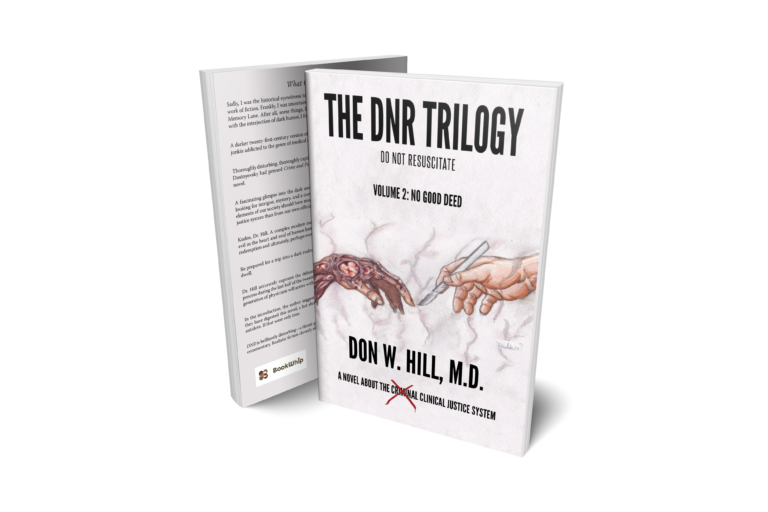

book review by Kat Kennedy
“If this life was meant to be my real life, then it should have come with a better set of instruction.”
This second novel in the series finds Doctor J.D. Brewster wracked with guilt over the vicious assault in the
employee parking lot of Gulf Coast College of Medicine, which caused his friend, charge nurse Irene Segulla
to sustain “devastating injuries to her Face and generalized head and neck region.” Brewster vows to “hunt down the two
bastards who attacked her.” When the study he is participating in shuts down, Brewster is spared from inoculating the great apes
in the lab with a potentially deadly virus, but he now must complete his clinical clerkship training for the current year. Brewster,
Ben Fielder, and a giant of a man called Wooly Mammoth begin the rotations together. Wooly Mammoth, whose real name is Willy
Mammon, is the son of a gambler and former colleague of Brewster’s father. He shares knowledge of Brewster’s deceased father
that is quite shocking but not as astonishing as what he will soon experience. What happens during the rotations causes
Brewster and his colleagues to question the sanity of many of the attending physicians and their own. They encounter the sadist,
Dr. Street, in the burn unit on their first rotation, and their time there is brutal. During Brewster’s clinical rotations, he becomes
even more angry, cynical, and vicious.
This novel is a satirical look at the medical profession. The author, a medical doctor, draws on his life experiences in this trilogy.
Hill’s dynamic writing grabs the reader’s attention, and one is drawn immediately into the world of Brewster. Not only does
Brewster have an adventurous and sometimes morbid work life, but his family life is also filled with bizarre characters.
Brewster’s Uncle John will have readers laughing out loud at his antics. His mother is a depressed, angry woman who is brutal
toward her two sons, William and J. D. His girlfriend, Stella, is quickly putting herself in medical danger with her affection for
sweets. Brewster discovers the information given to him by Wooly Mammoth concerning his father may indeed be true. Each
event in his life pushes him closer to an existential crisis.
Hill fills the novel with plenty of irony. For instance, his choice of names for many of the doctors is drawn from their specialty,
such as the urology resident, I.P. Stream. Though the novel has moments of hilarity, some scenes are hard to read. For example,
Wooly Mammoth reveals a harrowing experience he endured during the Vietnam war. Patients in the hospital also tell of the
brutalities of war in their revelations of the atrocities which occurred during America’s many conflicts and wars. These scenarios
are as harrowing as those that Brewster encounters during his clinical rotations. It is also revealed to Brewster and his
colleagues that the hospital’s staff participates in what is known as “the clinical justice system.” Especially onerous incarcerated
criminals are mysteriously beaten almost to death and sent to the hospital where a crew is waiting to harvest their organs. Moral
ambiguity is prevalent in the novel. Should a child rapist and killer be allowed to live when his death might save several more
worthy lives? Should sadistic doctors be allowed to care for patients? Where is God in the face of heinous acts of torture and
brutality?
Though this novel contains graphic descriptions of illnesses, abuse, and truly horrific acts that may be hard for some to read, it
is a fascinating and disturbing work. It ends in a cliffhanger that makes one want to jump into the last of the series immediately.
This is a truly gripping novel that will have readers on the edge of their seats and perhaps asking the novel’s recurring question,
“Did God back the wrong primate?”